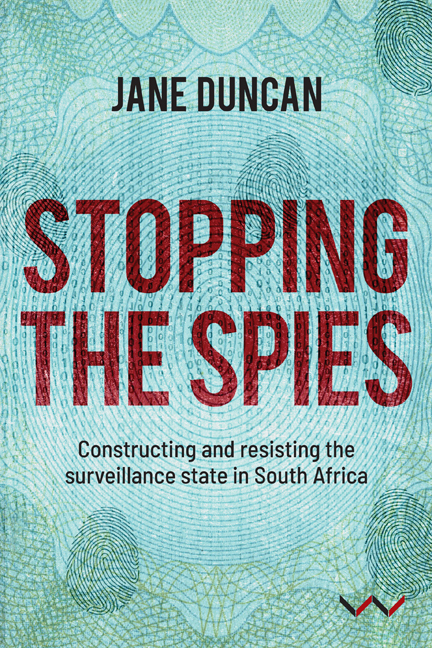Book contents
- Frontmatter
- Contents
- Acknowledgements
- List of Figures and Tables
- List of Acronyms
- Preface
- Introduction
- Chapter 1 Theorising the surveillance state
- Chapter 2 Is privacy dead? Resistance to surveillance after the Snowden disclosures
- Chapter 3 The context of surveillance and social control in South Africa
- Chapter 4 Lawful interception in South Africa
- Chapter 5 State mass surveillance, tactical surveillance and hacking in South Africa
- Chapter 6 Privacy, surveillance and public spaces in South Africa
- Chapter 7 Privacy, surveillance and population management: the turn to biometrics
- Chapter 8 Stopping the spies: resisting unaccountable surveillance in South Africa
- Chapter 9 Conclusion
- Notes
- Select Bibliography
- Index
Chapter 2 - Is privacy dead? Resistance to surveillance after the Snowden disclosures
Published online by Cambridge University Press: 17 May 2019
- Frontmatter
- Contents
- Acknowledgements
- List of Figures and Tables
- List of Acronyms
- Preface
- Introduction
- Chapter 1 Theorising the surveillance state
- Chapter 2 Is privacy dead? Resistance to surveillance after the Snowden disclosures
- Chapter 3 The context of surveillance and social control in South Africa
- Chapter 4 Lawful interception in South Africa
- Chapter 5 State mass surveillance, tactical surveillance and hacking in South Africa
- Chapter 6 Privacy, surveillance and public spaces in South Africa
- Chapter 7 Privacy, surveillance and population management: the turn to biometrics
- Chapter 8 Stopping the spies: resisting unaccountable surveillance in South Africa
- Chapter 9 Conclusion
- Notes
- Select Bibliography
- Index
Summary
‘I think it's important to recognise that you can't have 100 per cent security and also then have 100 per cent privacy and zero inconvenience.’ This was how US President Barack Obama responded to questions about the Snowden revelations of the NSA's spying activities. Politicians have used the supposed trade-off between privacy and security as a means of legitimising privacy-invading national security measures, including communications surveillance. Never in modern world history have there been so many violations of the right to privacy. Yet, never in modern world history have there been so many privacy protections. How should this seeming contradiction be explained? This chapter will examine this issue and, in doing so, will consider the range of actors involved in resisting unaccountable surveillance, their organising concepts, strategies and tactics, and will ask whether they are ‘fit for purpose’.
THE FALL AND RISE OF MILITARY TECHNOLOGIES, PRACTICES AND LOGICS
Four per cent of companies which feature in Privacy International's Surveillance Industry Index are also major arms producers, including BAE Systems (UK), Boeing (US) and Elbit Systems (Israel). Arms manufacturers have expanded into cybersecurity, which has proved to be a hugely lucrative area: a boon for companies that are seeing their profits decline due to governmental budget cuts on conventional arms. While the US ramped up its military spending in the wake of the 9/11 attacks, its withdrawal from ‘theatres of war’ like Iraq impacted negatively on arms manufacturers, as did the reduction in military spending of other governments in the wake of the 2008 global recession. In an attempt to adapt to this changing global situation, some of the major arms manufacturers increased their involvement in the lucrative and ever-expanding surveillance market. A case in point is BAE Systems, which expanded the intelligence and cybersecurity aspects of its business from the late 2000s onwards, acquiring existing businesses in this area. The company intensified this focus when it experienced declining revenues owing to the falling demand for conventional armaments. Arms manufacturer Lockheed Martin has expanded its activities to include providing intelligence-gathering and analysis capacities to the Central Intelligence Agency (CIA) and other US government agencies, and even to commercial retail giant Walmart to spy on critics of its corporate practices.
- Type
- Chapter
- Information
- Stopping the SpiesConstructing and resisting the surveillance state in South Africa, pp. 37 - 56Publisher: Wits University PressPrint publication year: 2018



